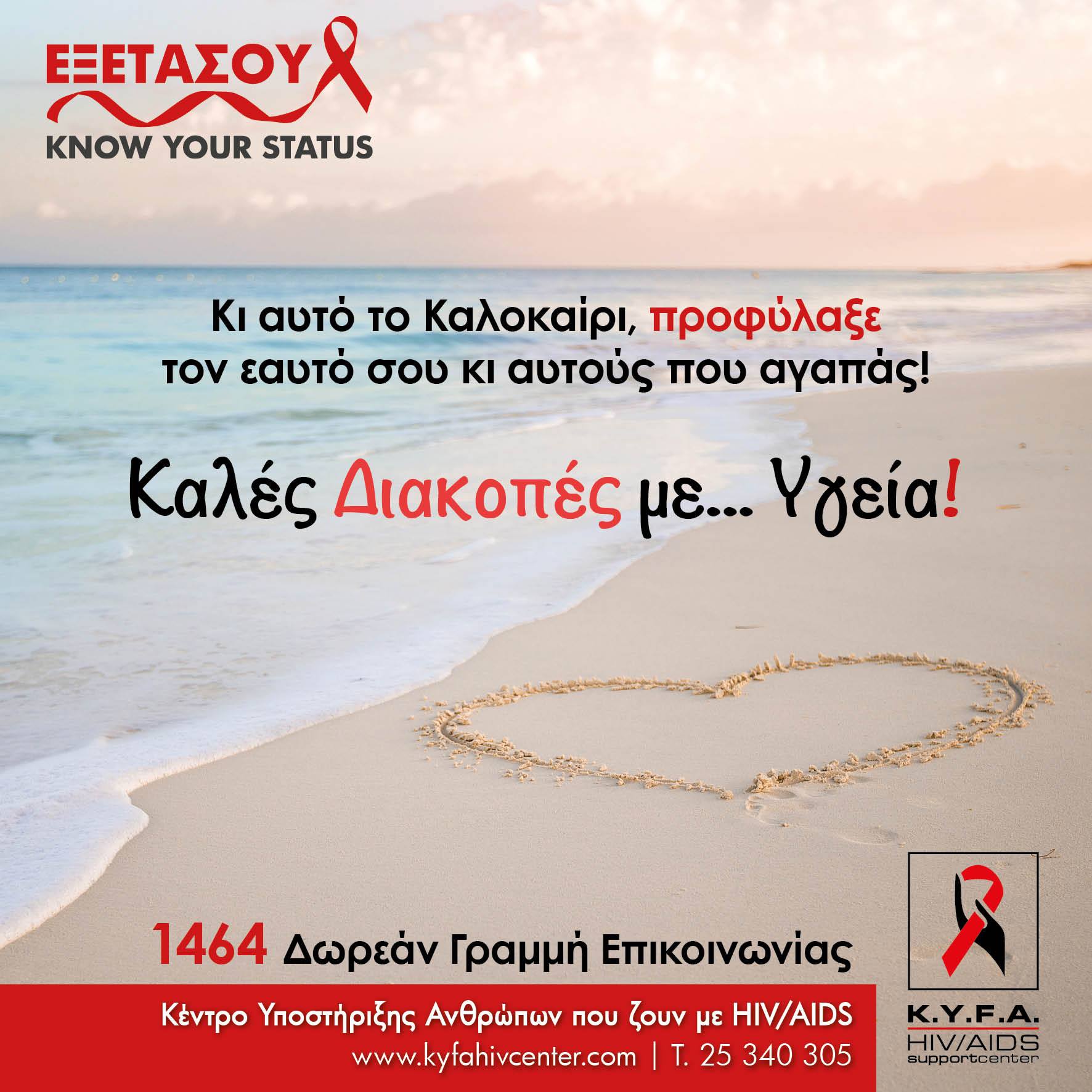Δωρεάν Γραμμή Επικοινωνίας 1464:
– Κέντρο Υποστήριξης Ανθρώπων που ζουν με HIV/AIDS
– KYFA Checkpoint [Δωρεάν Εξέταση HIV/HEPATITIS] – Πληροφορίες και Υποστήριξη
#ΚΥΦΑ #KYFACheckPoint #CallNow
#InfoFree – Ο κίνδυνος της μετάδοσης του HIV μειώνεται σημαντικά, χρησιμοποιώντας προφυλακτικό. Μπορείς να προστατεύσεις τον εαυτό σου, αλλά και τον / την σύντροφό σου από τον HIV με τη σωστή ενημέρωση.
Κατανοώντας αρχικά πώς μεταδίδεται ο HIV και γνωρίζοντας καλά τον εαυτό σου και τις πράξεις σου, είναι το πρώτο σημαντικό βήμα για την προστασία έναντι του ιού HIV. Μείωσε τον κίνδυνο μόλυνσης HIV αποφεύγοντας ενέργειες που μπορεί να σε βάλουν σε κίνδυνο και κάνε πάντα ασφαλές σεξ. Μη φοβάσαι να εξετασθείς ή να πείσεις το / τη σύντροφό σου να εξετασθεί.
Μίλησε με τους φίλους και την οικογένειά σου. Έλα κοντά μας για Ενημέρωση! Μαζί… Μπορούμε! Μη φοβάσαι, Ενημερώσου, Προφυλάξου και Ζήσε!
______________________________________
How is HIV spread? HIV can spread only in certain body fluids from a person infected with HIV:
– Blood
– Semen
– Pre-seminal fluids
– Rectal fluids
– Vaginal fluids
– Breast milk
The spread of HIV (called HIV transmission) is only possible if these fluids come in contact with a mucous membrane or damaged tissue or are directly injected into the bloodstream (from a needle or syringe).
Mucous membranes are found inside the rectum, the vagina, the opening of the penis, and the mouth.
How can I reduce my risk of getting HIV?
Anyone can get HIV, but you can take steps to protect yourself from HIV infection.
– Get tested and know your partner’s HIV status. Talk to your partner about HIV testing and get tested before you have sex.
– Have less risky sex. Oral sex is much less risky than anal or vaginal sex. Anal sex is the most risky type of sex for HIV transmission.
– Use condoms. Use a condom correctly every time you have vaginal, anal, or oral sex. Read this fact sheet from the Centers for Disease Control and Prevention (CDC) on how to use condoms correctly.
– Limit your number of sexual partners. The more partners you have, the more likely you are to have a partner with HIV whose HIV is not well controlled or to have a partner with a sexually transmitted disease (STD). Both of these factors can increase the risk of HIV transmission. If you have more than one sexual partner, get tested for HIV regularly.
– Get tested and treated for STDs. Insist that your partners get tested and treated too. Having an STD can increase your risk of becoming infected with HIV or spreading it to others.
– Talk to your health care provider about pre-exposure prophylaxis (PrEP). PrEP is an HIV prevention option for people who don’t have HIV but who are at high risk of becoming infected with HIV. PrEP involves taking a specific HIV medicine every day. PrEP should always be combined with other prevention options, such as condoms.
– Don’t inject drugs. But if you do, use only sterile drug injection equipment and water and never share your equipment with others.
Together… We can! Do not fear! You are not alone. Get the right Information, Take Precautions and Live! #Summer2019
Συνδεθείτε Μαζί Μας
Κ.Υ.Φ.Α (Κέντρο Υποστήριξης Ανθρώπων Που Ζουν Με HIV/AIDS). Tο Κέντρο Υποστήριξης ιδρύθηκε το Δεκέμβριο του 2000 από μια μικρή ομάδα των γυναικών και των ανδρών, που αναγνώρισε την ανάγκη για υποστήριξη των ανθρώπων που ζουν με HIV/AIDS.

